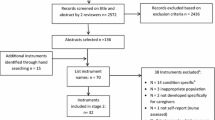Abstract
Purpose
To evaluate caregivers’ experience of oncology services for ambulatory patients and to develop a short instrument (FAMCARE-6) suitable for computerised administration in the clinical setting.
Methods
A sample of 234 caregivers recruited from 388 ambulatory oncology patients completed a computerised version of the 20-item family satisfaction with advanced cancer care (FAMCARE) instrument, which was originally developed for use in palliative care settings.
Results
Caregivers reported generally high satisfaction with all aspects of ambulatory oncology services: overall score; mean, 3.96 (SD, 0.67); information giving, 3.88 (0.78); physical patient care, 4.00 (0.71); availability of care, 3.89 (0.77); and psychosocial care, 4.05 (0.72), from a possible score of 5. Factor analyses identified a single factor structure; the items were reduced to six (FAMCARE-6), which yielded a scale with adequate psychometric properties (completion rates over 90% for every item, correlation of 0.7 or above with the factor identified in the individual item factor analysis, and internal reliability of α = 0.85). The overall mean score was 3.91 (SD, 0.73) for the FAMCARE-6.
Conclusions
FAMCARE-6 can be used to assess caregiver satisfaction with ambulatory oncology services and may be suitable to be included as part of a computerised screening system for the psychological care of oncology patients.
Similar content being viewed by others
References
Emanuel EJ, Fairclough DL, Slutsman J, Alpert H, Baldwin D, Emanuel LL (1999) Assistance from family members, friends, paid care givers, and volunteers in the care of terminally ill patients. N Engl J Med 341:956–963
Girgis A, Johnson C, Aoun S, Currow D (2006) Challenges experienced by informal caregivers in cancer. Cancer Forum 30:21–25
Morris SM, Thomas C (2001) The carer’s place in the cancer situation: where does the carer stand in the medical setting? Eur J Cancer Care (Engl) 10:87–95
Kristjanson LJ, Aoun S (2004) Palliative care for families: remembering the hidden patients. Can J Psychiatry 49:359–365
Ringdal GI, Jordhoy MS, Kaasa S (2003) Measuring quality of palliative care: psychometric properties of the FAMCARE Scale. Qual Life Res 12:167–176
Thomas C, Morris SM (2002) Informal carers in cancer contexts. Eur J Cancer Care (Engl) 11:178–182
Edwards B, Ung L (2002) Quality of life instruments for caregivers of patients with cancer: a review of their psychometric properties. Cancer Nurs 25:342–349
Carter G, Lewin T, Rashid G, Adams C, Clover K (2008) Computerised assessment of quality of life in oncology patients and carers. Psychooncology 17:26–33
Clover K, Carter GL, Mackinnon A, Adams C (2009) Is my patient suffering clinically significant emotional distress? Demonstration of a probabilities approach to evaluating algorithms for screening for distress. Support Care Cancer -online publication March 2009: doi:10.1007/s00520-009-0606-6
Clover K, Rogers K, Carter G, Adams C (2008) QUICA-TOUCH: the first 12 months of screening for distress, pain and psychopathology. Asia Pacific J Clin Oncol 4(Suppl 2):A60
Kristjanson LJ (1989) Quality of terminal care: salient indicators identified by families. J Palliat Care 5:21–30
Kristjanson LJ (1993) Validity and reliability testing of the FAMCARE scale—measuring family satisfaction with advanced cancer care. Soc Sci Med 36:693–701
The WHOQOL Group (1998) Development of the World Health Organization WHOQOL-BREF quality of life assessment. Psychol Med 28:551–558
Kristjanson LJ, Leis A, Koop PM, Carriere KC, Mueller B (1997) Family members’ care expectations, care perceptions, and satisfaction with advanced cancer care: results of a multi-site pilot study. J Palliat Care 13:5–13
Medigovich K, Porock D, Kristjanson LJ, Smith M (1999) Predictors of family satisfaction with an Australian palliative home care service: a test of discrepancy theory. J Palliat Care 15:48–56
Knight RG, Williams S, McGee R, Olaman S (1998) Caregiving and well-being in a sample of women in midlife. Aust N Z J Public Health 22:616–620
Allen SM, Goldscheider F, Ciambrone DA (1999) Gender roles, marital intimacy, and nomination of spouse as primary caregiver. Gerontologist 39:150–158
Grunfeld E, Coyle D, Whelan T, Clinch J, Reyno L, Earle CC, Willan A, Viola R, Coristine M, Janz T, Glossop R (2004) Family caregiver burden: results of a longitudinal study of breast cancer patients and their principal caregivers. Can Med Assoc J 170:1795–1801
Ringdal GI, Jordhoy MS, Kaasa S (2002) Family satisfaction with end-of-life care for cancer patients in a cluster randomized trial. J Pain Symptom Manage 24:53–63
Kristjanson LJ (1986) Indicators of quality of palliative care from a family perspective. J Palliat Care 1:8–17
Heading G, Mallock N, Sinclair S, Bishop J (2008) New South Wales Cancer Patient Satisfaction Survey 2007, Interim Report. Cancer Institute NSW catalogue number: CR-2008-1
Author information
Authors and Affiliations
Corresponding author
Appendix 1
Appendix 1
FAMCARE-6
Instructions
Think about the care that your family member has received.
Please answer the following questions below indicating how satisfied you are with the care received: very satisfied (VS), satisfied (S), undecided (U), dissatisfied (D) or very dissatisfied (VD).
Please circle the letters below that best match your experience.
How satisfied are you with
1. Answers from health professionals | VS | S | U | D | VD |
2. Information given about side effects | VS | S | U | D | VD |
3. Speed with which symptoms are treated | VS | S | U | D | VD |
4. Availability of doctors to the family | VS | S | U | D | VD |
5. Time required to make a diagnosis | VS | S | U | D | VD |
6. Availability of the doctor to the patient | VS | S | U | D | VD |
Scale modified from the original FAMCARE Scale (Kristjanson, 1993) [12].
Rights and permissions
About this article
Cite this article
Carter, G.L., Lewin, T.J., Gianacas, L. et al. Caregiver satisfaction with out-patient oncology services: utility of the FAMCARE instrument and development of the FAMCARE-6. Support Care Cancer 19, 565–572 (2011). https://doi.org/10.1007/s00520-010-0858-1
Received:
Accepted:
Published:
Issue Date:
DOI: https://doi.org/10.1007/s00520-010-0858-1




